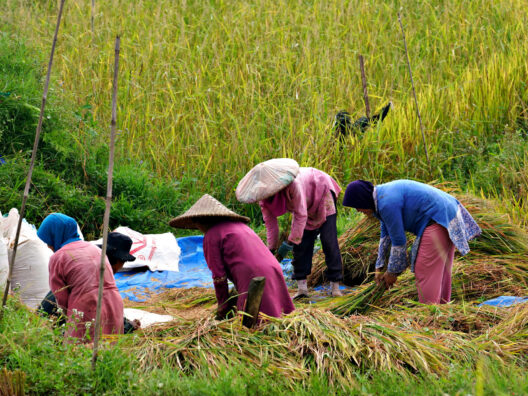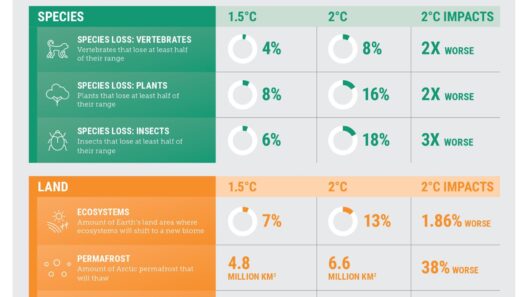Ghana stands at a pivotal juncture, grappling with the multifaceted challenges posed by climate change. The warming planet not only threatens the ecological balance but also has profound implications for the nation’s economy. The intricate relationship between environmental conditions and economic vitality becomes increasingly critical, as both local communities and national frameworks endeavor to adapt to an evolving climate. Understanding Ghana’s climate crossroads necessitates a multifaceted exploration of economic impacts, societal shifts, and potential pathways toward sustainability.
The agricultural sector, which forms the backbone of Ghana’s economy, is particularly vulnerable to the vicissitudes of climate variability. With nearly 60% of the population reliant on agriculture for their livelihoods, any detriment to crop yields is a cause for concern. Erratic rainfall patterns, prolonging droughts, and increasingly severe flooding events jeopardize food security, leading to volatility in market prices. The reliance on rain-fed agriculture exacerbates these vulnerabilities; farmers often struggle to predict planting seasons and harvest outcomes. This uncertainty undermines both subsistence and commercial agriculture, forcing many to abandon their fields or seek alternative means of income, which may not be sustainably viable.
Moreover, the implications of global warming extend beyond immediate agricultural productivity. A warming climate is likely to exacerbate pest and disease prevalence, targeting crops and livestock alike. As pests adapt to warmer conditions, their range expands, creating additional challenges for farmers who must contend with unfamiliar threats to their yields. The economic ramifications of these phenomena are significant; reduced agricultural productivity can lead to higher food prices, increased import dependency, and ultimately, rising poverty levels.
The fisheries sector, too, faces dire consequences from climate impacts. Ghana’s coastal communities depend heavily on fishing, both as a source of protein and economic sustenance. However, rising sea temperatures result in altered fish migration patterns and declining fish stocks. As fish become scarce, local fishers face diminished catches, reducing incomes and exacerbating food insecurity. Furthermore, as overfishing becomes increasingly prevalent, vulnerable marine ecosystems experience degradation, which can lead to long-term ecological consequences that are difficult to reverse.
In urban environments, climate change catalyzes a range of economic consequences. Rapid urbanization, coupled with inadequate infrastructure, amplifies the vulnerability of cities such as Accra to climate-induced disasters. The phenomenon of urban flooding becomes more frequent, creating chaos in transportation, displacing families, and damaging critical infrastructure. When cities become overwhelmed, the associated economic costs mount—wasted resources, lost productivity, and increased demand for disaster recovery measures strain local and national budgets.
It is imperative to recognize the interplay between climate change and energy consumption. Ghana’s burgeoning energy sector grapples with challenges of sustainability and accessibility. As the population grows, the demand for energy escalates, further exacerbating greenhouse gas emissions. The reliance on fossil fuels, coupled with inadequate investment in renewable energy sources, poses a dual challenge: meeting energy needs while mitigating climate impacts. Transitioning toward sustainable energy solutions could pave the way for economic resilience, but the pathway is fraught with complexities, necessitating significant investment and policy alignment.
Ghana’s economic landscape is not solely defined by challenges; opportunities abound in the context of a warming planet. The global push for sustainable practices presents avenues for innovation and investment. Embracing climate-smart agriculture, investing in resiliency measures, and promoting sustainable fisheries can become defining features of Ghana’s economic strategy moving forward. Moreover, the burgeoning global market for green technologies offers Ghana a chance to redefine its economic trajectory, positioning it as a leader in renewable technologies, ecotourism, and sustainable practices.
Furthermore, climate change impacts disproportionately affect marginalized communities in Ghana. Vulnerable populations, such as women and those in informal employment, frequently bear the brunt of climate-related hardships. Unequal access to resources, information, and decision-making plays a role in perpetuating these inequities. Addressing these systemic inequities must become a central component of Ghana’s economic and climate strategies, ensuring that adaptation measures are locally informed and equitable.
Education and awareness also play critical roles in navigating this climate crossroads. By fostering a greater understanding of climate impacts, communities can implement localized adaptation strategies that align with their unique circumstances. Improved access to information empowers individuals to make informed decisions regarding agricultural practices, resource management, and disaster preparedness, ultimately contributing to the resilience of local economies. This grassroots effort, combined with national policy frameworks, can cultivate a cohesive response to the entrenched challenges posed by climate change.
Ghana’s climate crossroads present a compelling case study of the intricate ties between economic vitality and environmental stewardship. The task ahead is daunting, but the potential for sustainable economic growth is within reach. By proactively addressing the impacts of a warming planet, prioritizing equitable adaptation measures, and fostering sustainable practices, Ghana can transform its vulnerabilities into opportunities for resilience and prosperity. The journey toward a sustainable future demands collective action and an unwavering commitment to fostering ecological integrity while galvanizing economic development.
Ultimately, Ghana’s approach to climate change will reverberate beyond its borders. As the world confronts the existential threat of climate change, lessons gleaned from Ghana’s experiences could inform broader dialogues about sustainability and resilience. The pursuit of a sustainable economic future, particularly in the context of transitional climate dynamics, demands not only national commitment, but a global partnership. In this light, Ghana stands as both a microcosm of the global climate crisis and a beacon of hope for transformative change.








